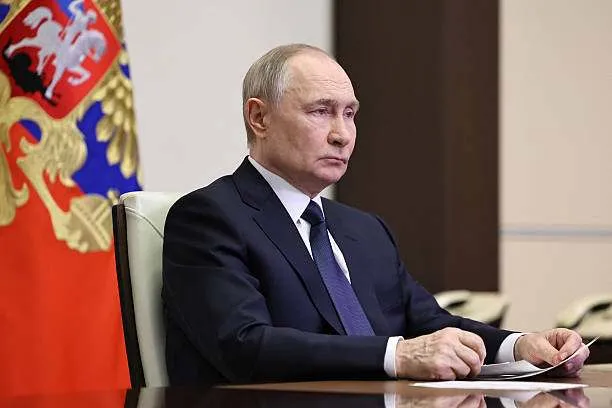Putin orders surprise ceasefire amid Victory Day commemorations
Russian President Vladimir Putin calls for temporary ceasefire during Victory Day commemorations, signaling possible escalation or breakthrough in peace efforts.
By Anna Fadiah and Hayu Andini
Russian President Vladimir Putin has unexpectedly ordered a three-day ceasefire from May 8 to May 10, coinciding with Moscow's World War II Victory Day commemorations. This latest move marks an attempt to halt fighting during a significant national holiday, but it also raises questions about the sincerity of Russia's peace efforts, especially considering the history of similar announcements that have been marred by accusations of violations.
According to a Kremlin statement released on Monday, the Russian side declared the ceasefire from midnight on May 7-8 to midnight on May 10-11. The statement emphasized that all combat operations would be suspended during this period. Moscow also indicated that it expected Ukraine to declare a similar ceasefire, with the warning that any violations by Ukraine would be met with an “adequate and effective response” from Russian forces.
A history of ceasefire violations
Putin's call for a ceasefire follows a pattern seen earlier this year, when the Russian president ordered a similar truce during Easter. However, both sides accused each other of violating the temporary halt in hostilities, which had little long-term effect on the ongoing conflict. Despite the ceasefire’s failure to bring lasting peace, it led to a temporary reduction in fighting, suggesting that such announcements may still play a role in short-term conflict de-escalation.
The Kremlin's declaration of a ceasefire over the 80th anniversary of Victory Day underscores the continued importance of this historical event in Russian politics, even as the conflict in Ukraine rages on. However, Putin’s stance on peace remains highly controversial. Last month, he rejected a US proposal for a full and unconditional 30-day ceasefire, which Ukraine had agreed to, casting doubt on Russia's true intentions.
Trump's skepticism on peace talks
The timing of this ceasefire coincides with increasing international scrutiny of Putin’s peace efforts. US President Donald Trump, who recently met with Ukrainian President Volodymyr Zelensky at Pope Francis's funeral, questioned whether Putin was genuinely interested in peace. In a post on Truth Social, Trump suggested that the continued missile attacks on civilian areas—such as recent strikes on Zelensky’s home city of Kryvyi Rig and the northeastern city of Sumy—indicated that Putin was not truly committed to halting the war. Trump's comment, “maybe he doesn't want to stop the war, he's just tapping me along,” reflects growing doubts about Russia's willingness to engage in meaningful negotiations.
Indeed, Russian missile strikes have been a constant feature of the conflict, with civilian casualties mounting. Over the past month, Russian missiles have killed dozens of civilians in large-scale strikes targeting Ukrainian cities. As both sides prepare for another round of diplomatic talks, the military escalation raises concerns that the ceasefire may only be a temporary pause rather than a genuine step toward a lasting resolution.
Russia insists on territorial claims
In a sign of the challenges facing any potential peace talks, Russian Foreign Minister Sergei Lavrov reaffirmed Moscow's position on territorial claims. In an interview with Brazil's O Globo newspaper, Lavrov stated that international recognition of Russia’s annexation of Crimea and several other Ukrainian regions, including Donetsk, Luhansk, Kherson, and Zaporizhzhia, was “imperative” for resolving the conflict. Lavrov’s remarks echo Russia’s stance that the annexations of these regions—territories that Ukraine and its European allies consider illegally occupied—must be acknowledged as part of any peace agreement.
Kyiv, on the other hand, has firmly rejected these demands. President Zelensky has repeatedly stated that Ukraine will never recognize Russia’s claims over any occupied territory, including Crimea. This significant difference in positions has made direct negotiations difficult, with Ukraine accusing Russia of conducting a "land grab" and violating international law.
Putin’s new alliance with North Korea
As the ceasefire announcement unfolds, Russia’s military gains continue on the battlefield. Over the weekend, Russian forces declared full control of the Kursk region, a significant development given Ukraine's efforts to launch a cross-border assault for more than eight months. Russian officials have also expressed gratitude to North Korean leader Kim Jong Un for providing military support, which analysts suggest has been crucial in securing Russia’s latest territorial victories.
In addition to the ongoing battle in Kursk, Russian forces announced their latest advance in the northeastern Kharkiv region, capturing the village of Kamianka. This marks another territorial gain in a region that has seen heavy fighting since the early days of Russia’s invasion of Ukraine.
US frustration over stalled peace talks
While Russia and Ukraine have not held direct talks since the beginning of Moscow’s offensive in 2022, there has been growing frustration in Washington over the lack of progress in peace negotiations. The Biden administration has worked behind the scenes to broker peace, yet Russia’s unyielding territorial demands and Ukraine's firm stance against acknowledging annexations have hindered any breakthrough.
As the situation in Ukraine continues to evolve, the international community remains on edge, concerned about the possibility of further escalation. The United Nations has called on both Russia and Ukraine to show “maximum restraint” to prevent the conflict from spiraling out of control.
A fragile path to peace
While Putin’s ceasefire order may provide a temporary pause in the fighting, it also highlights the deep divisions that persist between Russia and Ukraine, as well as the broader geopolitical implications of the war. As both sides remain entrenched in their positions, the possibility of a meaningful peace agreement seems distant, and analysts warn that the ongoing military operations could soon intensify once the ceasefire period ends.
With the Kremlin reaffirming its territorial demands and Ukraine steadfast in its refusal to recognize Russian annexations, the future of peace talks remains uncertain. The world watches closely, hoping for a breakthrough but fearing that the war in Ukraine may continue to escalate.

